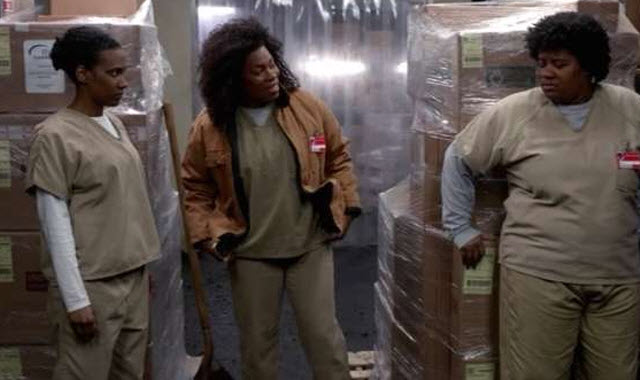
Orange is the New Black‘s second season begins in extreme isolation: focused on a singular character and a journey separated from the rest of the show, it goes to great lengths to express Piper’s loneliness on her journey from New York to Chicago and back, how frightening a world full of enemies and strangers can really be. Quietly, it sets the stage for the entire season, a season full of characters being forced into isolation by forces they can’t control – and in the constantly demeaning, depressing world of prison, being alone is every single person’s greatest fear. Sure, you’d think it would be staying alive: but in a world where reality beats the compassion out of your soul, death no longer holds the asphyxiating grip on your mind you might think it would. No, the real fear is being alone, being without someone who talk to, to call a friend, lover, or family: and that fear Piper deals with comes full-circle with Vee in OitNB‘s climatic episodes, two of the finest hours this show’s ever produced.
And all it took was a little rain: once the power turned off in Litchfield, every character was forced into open space, a dramatic situation constructed to re-create the feeling of meal time in prison, the time when true alliances always come to light – something we’ve seen time and time again in the show’s two seasons. It’s Red’s fighting ground, a place where she feels she has the advantage, even when it looks like she’s being dominated on paper. Most importantly, it’s a petri dish to place each and every character of OitNB into, showing just how united – or alone – they were, truths that couldn’t be more obvious when surrounded by every other member of the prison, both in brown and blue uniforms.
Through it all, the ever-present thread of family remains: and again, as Red’s family strengthens around her, Vee’s family begins to weaken, torn apart by the rotten foundation Vee laid it on. It’s season two’s most masterful stroke of storytelling: Vee’s character is a complete psychopath, a talented manipulator whose greatest trick was convincing herself that people loved her – yet OinTB was able to make her feel human, a woman whose moral emptiness gave definition to the desperation of her attempts to maintain control. Her flashbacks with R.J. aren’t just a salacious addition to her backstory: her sleeping with RJ right before having him killed (by a dirty cop, no less) shows just how awful of a human being she is – and paints her as the most depressing character on the show, a woman so self-preserving, she destroys everything and anything around her. Being a survivor is something to be proud of, sure: but when that survival comes at the cost of others, it’s only a matter of time before a cancer-stricken form of karma comes down the road to inject a little reality into the situation, bringing Vee’s reign of terror to a poignant, decidedly wicked end.
It very much mirrors what Mrs. Fig experiences in these two episodes, a lovely examination of what can happen on the other side of the bars when one constructs a prison around themselves: Fig may escape with her reputation, but she leaves with the knowledge her marriage is broken and her career is shot, not to mention her desperate attempt to convince Caputo to keep her in power. On both sides of the prison walls, Fig and Vee are two people reeling without a family: two mothers who failed to protect their children, and paid dearly for their sins against humanity. The parallels between the two antagonists are subtle, but very much there: Fig transferring prisoners/Vee arbitrarily deciding who is in the “family”, both making fake promises to the ones in their care, and both trying to find scapegoats for consequences they were too afraid to face themselves – and in a way, Vee gets the better end of the deal, finding peace in death where Fig will never be able to in life, trapped in the construction of her own personal and professional failures, a fitting end for the two most powerful, corrupted women of Litchfield.
With such dark endings awaiting these two characters, it’s no surprise there’s so many cathartic moments surrounding it, all of them rewarding in their own way. Headlined by Poussey and Taystee’s embrace in the library, an emotional watermark for the second season as a whole, “We Have Manners. We’re Polite.” are full of heart-warming moments, the kind of “light in the overwhelming darkness” material that OitNB has made its bread and butter. And it’s all elevated by the undercurrent of dark humor plastered throughout, from Healy’s true fear of lesbian world domination to Caputo’s absolutely horrific first 48 hours on his well-deserved (?) promotion to assistant warden: even as things grow happier on Orange, the show never loses its slanted, often overtly-expressed thoughts on the modern world and the American prison industry: and over the course of 150 minutes (yes, the two final episodes are that long), expressed what OitNB is really about in the most symbiotic, poignant ways imaginable.
See, the world is going to try and stomp out your soul. People, social systems, political games, the stresses of everyday modern life: they beat us down from every corner – and the only time we’re able to escape it, to truly escape it all, is in the presence of those we love, others as flawed and messed up as we are. Without family, we are nothing: it’s a lesson Red learned all season, and something Vee learned (the hardest way possible) during the climatic events of this season. It’s something every character had to face in the presence of Vee, a woman whose influence crept over the prison like a virus, the worst kind of ‘mother’ one could ever hope for: she challenged friendships and loyalties, her attempts to weaken the bonds between those around her only strengthening them in the end. Orange is the New Black is forever a show about family: and nothing captures the sentiments of that better than these two episodes, a wonderful, emotional conclusion to a stunning season of television.
Other thoughts/observations:
– with those final two episodes, Orange is the New Black solidified its place in the upper pantheon of dramas currently on television. Those are just two great freakin’ hours of TV.
– other great moments: Ruiz’s boyfriend talking to their child, Bennett finally coming clean about impregnating Daya (to no avail, of course), and of course, Caputo bathing in the glory of his victory over Mrs. Fig.
– O’Neill playing the banjolele? Pure gold.
– And that’s a wrap on Orange is the New Black’s second season – thanks for reading!
[Photo via Netflix]
 Follow Us
Follow Us





